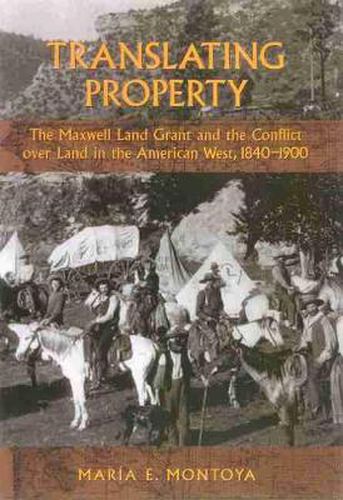Readings Newsletter
Become a Readings Member to make your shopping experience even easier.
Sign in or sign up for free!
You’re not far away from qualifying for FREE standard shipping within Australia
You’ve qualified for FREE standard shipping within Australia
The cart is loading…






When American settlers arrived in the southwestern borderlands, they assumed that the land was unencumbered by property claims. But, as Maria Montoya shows, the Southwest was no empty quarter simply waiting to be parceled up. Although Anglo farmers claimed absolute rights under the Homestead Act, their claims were contested by Native Americans who had lived on the land for generations, Mexican magnates like Lucien Maxwell who controlled vast parcels under grants from Mexican governors, and foreign companies who thought they had purchased open land. The result was that the Southwest inevitably became a battleground between land regimes with radically different cultural concepts.
The struggle over the Maxwell Land Grant, a 1.7-million-acre tract straddling New Mexico and Colorado, demonstrates how contending parties reinterpreted the meaning of property to uphold their claims to the land. Montoya reveals how those claims, with their deep historical and racial roots, have been addressed to the satisfaction of some and the bitter frustration of others.
Translating Property describes how European and American investors effectively mistranslated prior property regimes into new rules that worked to their own advantage–and against those who had lived on the land previously. Montoya explores the legal, political, and cultural battles that swept across the Southwest as this land was drawn into world market systems. She shows that these legal issues still have real meaning for thousands of Mexican Americans who continue to fight for land granted to their families before the Treaty of Guadalupe Hidalgo, or for continuing communal access to land now claimed by others.
This new edition of Montoya’s book brings the land grant controversy up to date. A year after its original publication, the Colorado Supreme Court tried once more to translate Mexican property ideals into the U.S. system of legal rights; and in 2004 the Government Accounting Office issued the federal government’s most comprehensive effort to sort out the tangled history of land rights, concluding that Congress was under no obligation to compensate heirs of land grants.
Montoya recaps these recent developments, further expanding our understanding of the battles over property rights and the persistence of inequality in the Southwest.
$9.00 standard shipping within Australia
FREE standard shipping within Australia for orders over $100.00
Express & International shipping calculated at checkout
Stock availability can be subject to change without notice. We recommend calling the shop or contacting our online team to check availability of low stock items. Please see our Shopping Online page for more details.
When American settlers arrived in the southwestern borderlands, they assumed that the land was unencumbered by property claims. But, as Maria Montoya shows, the Southwest was no empty quarter simply waiting to be parceled up. Although Anglo farmers claimed absolute rights under the Homestead Act, their claims were contested by Native Americans who had lived on the land for generations, Mexican magnates like Lucien Maxwell who controlled vast parcels under grants from Mexican governors, and foreign companies who thought they had purchased open land. The result was that the Southwest inevitably became a battleground between land regimes with radically different cultural concepts.
The struggle over the Maxwell Land Grant, a 1.7-million-acre tract straddling New Mexico and Colorado, demonstrates how contending parties reinterpreted the meaning of property to uphold their claims to the land. Montoya reveals how those claims, with their deep historical and racial roots, have been addressed to the satisfaction of some and the bitter frustration of others.
Translating Property describes how European and American investors effectively mistranslated prior property regimes into new rules that worked to their own advantage–and against those who had lived on the land previously. Montoya explores the legal, political, and cultural battles that swept across the Southwest as this land was drawn into world market systems. She shows that these legal issues still have real meaning for thousands of Mexican Americans who continue to fight for land granted to their families before the Treaty of Guadalupe Hidalgo, or for continuing communal access to land now claimed by others.
This new edition of Montoya’s book brings the land grant controversy up to date. A year after its original publication, the Colorado Supreme Court tried once more to translate Mexican property ideals into the U.S. system of legal rights; and in 2004 the Government Accounting Office issued the federal government’s most comprehensive effort to sort out the tangled history of land rights, concluding that Congress was under no obligation to compensate heirs of land grants.
Montoya recaps these recent developments, further expanding our understanding of the battles over property rights and the persistence of inequality in the Southwest.